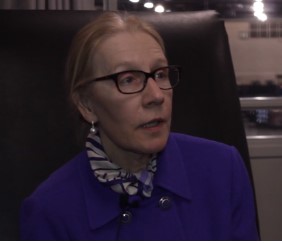User login
PHILADELPHIA – , said Elizabeth W. Loder, MD, chief of the Division of Headache and Pain at Brigham and Women’s Hospital in Boston, at the annual meeting of the American Headache Society. Women accrue credentials and are accorded respect as headache experts more slowly than men, she said. They are underrepresented among the speakers at headache conferences and are less likely than men to be invited to write editorials for peer-reviewed publications. Furthermore, a significant proportion of female headache specialists experiences sexual harassment in their professional environments.
Bias also affects interactions between patients and headache specialists, said Dr. Loder. Regardless of their gender, patients expect female care providers to be sympathetic and understanding. If they perceive that a female physician does not sufficiently display these attributes, they often write critical reviews of them on the Internet. In contrast, male physicians are not expected to be particularly caring, and patients praise them highly when they are.
Recognition of these biases is increasing, however. Representation of women in professional societies and on conference programs will improve, and emerging codes of conduct will reduce sexual harassment, said Dr. Loder. Headache specialists can take various steps, such as offering recognition and encouragement, to make the field more welcoming to women and to other disadvantaged groups.
PHILADELPHIA – , said Elizabeth W. Loder, MD, chief of the Division of Headache and Pain at Brigham and Women’s Hospital in Boston, at the annual meeting of the American Headache Society. Women accrue credentials and are accorded respect as headache experts more slowly than men, she said. They are underrepresented among the speakers at headache conferences and are less likely than men to be invited to write editorials for peer-reviewed publications. Furthermore, a significant proportion of female headache specialists experiences sexual harassment in their professional environments.
Bias also affects interactions between patients and headache specialists, said Dr. Loder. Regardless of their gender, patients expect female care providers to be sympathetic and understanding. If they perceive that a female physician does not sufficiently display these attributes, they often write critical reviews of them on the Internet. In contrast, male physicians are not expected to be particularly caring, and patients praise them highly when they are.
Recognition of these biases is increasing, however. Representation of women in professional societies and on conference programs will improve, and emerging codes of conduct will reduce sexual harassment, said Dr. Loder. Headache specialists can take various steps, such as offering recognition and encouragement, to make the field more welcoming to women and to other disadvantaged groups.
PHILADELPHIA – , said Elizabeth W. Loder, MD, chief of the Division of Headache and Pain at Brigham and Women’s Hospital in Boston, at the annual meeting of the American Headache Society. Women accrue credentials and are accorded respect as headache experts more slowly than men, she said. They are underrepresented among the speakers at headache conferences and are less likely than men to be invited to write editorials for peer-reviewed publications. Furthermore, a significant proportion of female headache specialists experiences sexual harassment in their professional environments.
Bias also affects interactions between patients and headache specialists, said Dr. Loder. Regardless of their gender, patients expect female care providers to be sympathetic and understanding. If they perceive that a female physician does not sufficiently display these attributes, they often write critical reviews of them on the Internet. In contrast, male physicians are not expected to be particularly caring, and patients praise them highly when they are.
Recognition of these biases is increasing, however. Representation of women in professional societies and on conference programs will improve, and emerging codes of conduct will reduce sexual harassment, said Dr. Loder. Headache specialists can take various steps, such as offering recognition and encouragement, to make the field more welcoming to women and to other disadvantaged groups.
EXPERT ANALYSIS FROM AHS 2019
